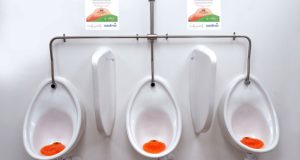With recent outbreaks of norovirus causing countless closures of hospital beds and schools across the country, the spotlight is on hand hygiene and its role in minimising the spread of infection. With the risk of illness heightened during the winter months, school business managers and cleaning professionals have an important role to play in encouraging hand hygiene compliance and minimising outbreaks amongst pupils.
A huge 60% of absences across schools in England can be attributed to illness according to the UK Department for Education. With this in mind, it is crucial that the spread of germs is minimised and that good handwashing habits are taught from an early age in the classroom. In fact, the Personal, Social, Health and Economic (PSHE) programme for Key Stages 1 and 2 in particular specifies that pupils should be taught how to maintain personal hygiene and improve their health and wellbeing.
Hands are the main vehicle for germ transfer, either by person-to-person contact or by touching everyday surfaces, and thus hand hygiene is one of the best methods of infection prevention in schools. For example, the NHS reports that norovirus can survive outside the body for several days. Washing hands with soap and water is one of the simplest and easiest ways for pupils to protect themselves and others from a range of illnesses. Child-friendly posters and activities can help raise awareness, and teaching materials such as presentations and activity sheets can also help highlight the basics of handwashing and its importance, as well as how, why and when to wash hands.
However, it is within the school facility itself where hand hygiene compliance can be most effectively targeted. Bright and attractive dispensers can bring handwashing to life in the washroom and help engage younger pupils. Washroom foam soap provider, SC Johnson Professional, make bespoke dispensers which give an opportunity to engage children further with bespoke messaging, helping to raise the importance of hand hygiene in a constructive and participative manner.
School business managers should also look at the types of dispensers installed; hygiene compliance can soon become irrelevant if the washroom itself is unhygienic. Bulk-filled, open soap systems are most commonly seen in washrooms, but in reality, they can present a serious hygiene problem. Airborne germs and bacteria can enter the soap reservoir, risking contamination – these dispensers are also often inadequately cleaned or refilled. According to a study by Chattman, Maxwell and Gerba, a huge 25% of refillable bulk soap dispensers are contaminated with unsafe levels of bacteria and can actually leave the hands with a shocking 25 times more bacteria after washing.
Sealed cartridge soap dispensers will bring maximum hygiene, with a measured dose of fresh product dispensed each time. The maintenance of washrooms has a significant impact on hand hygiene, and with a more readily replaceable cartridge, this is made easier and simpler for cleaning professionals. With cleaner and pleasant-to-use soap dispensers, pupils are far more likely to wash hands thoroughly.
Especially vital during the winter months, a two-pronged approach should be adopted in schools when it comes to encouraging hand hygiene compliance. With both raising awareness and the provision of hygienic, effective facilities and products, handwashing and thus infection prevention can be more easily and successfully implemented.
For more information on SC Johnson Professional’s products and resources for schools, head to www.scjp.com.





